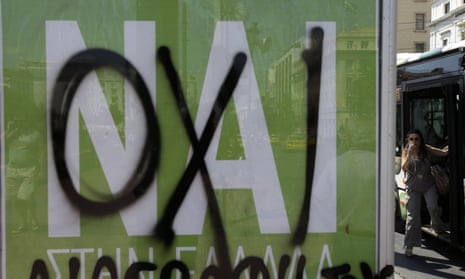More than one in 10 Greeks remains undecided ahead of Sunday’s referendum on whether to accept, or not, the planned reforms submitted by the European Commission, the European Central Bank and the IMF.
Most polls this week have registered small no leads.
But more recent figures have shown that the gap is narrowing following the imposition of capital controls.
The ProRata survey, for example, had no drop to 46% from 57% and yes rise to 37% from 30%. And a poll released Friday afternoon by Public Issue* has the yes vote ahead by 0.5 points. Another recent survey also showed yes ahead, by four points (with 17% of voters undecided in that particular set of figures), although the company that carried it out issued a statement saying the survey was incomplete and published without its consent.
The fact that there are many voters still undecided so close to the referendum does mean the outcome (if the polls are right) is impossible to predict with any certainty.
The question in Sunday’s vote is unclear and wordy, and the creditors’ proposals are technically no longer on offer. One week is an extraordinarily short time in which to call and hold an election, to the extent that the Council of Europe claims the vote doesn’t meet its standards. While others question the very legality of the vote.
All this adds up to confusion: it is not fully clear what Greeks are actually called to vote upon.
The ballot paper of the #greferendum question upon which the Greek people are called to vote on. (Translated) pic.twitter.com/hPGJcp49Gs
— The Greek Analyst (@GreekAnalyst) June 29, 2015
Because of this, a key factor will probably be what Greeks believe the vote to be about.
Those that think the referendum is about easing the burden of austerity are more likely to be inclined to vote no. In fact, support for Syriza remains high in voting intention polls and, in many surveys, has even increased since January’s general election.
However, the opposite is true if voters become convinced that the referendum puts into question Greece’s future in the euro.
Polls by ALCO and the University of Macedonia show that 74% and 81%, respectively, of Greeks want to remain in the single currency.
It’s clear why the no campaign repeatedly claims that a no vote would mean a better deal for Greece with its creditors.
While the yes camp (and most of Europe’s governments) is adamant that a no vote wouldn’t mean a better deal – it may mean no deal at all and instead would become a decisive step towards exiting the euro.
The point is: greek referendum won’t be a derby EU Commission vs Tsipras, but euro vs dracma. This is the choice.
— Matteo Renzi (@matteorenzi) June 29, 2015
More than 80% of voters are expected to turnout for Sunday’s vote, significantly higher than the 64% that voted in the general election in January (when the polls were relatively accurate).
*The Public Issue poll isn’t included in the graphic and average, as it was released after this piece was published.

Comments (…)
Sign in or create your Guardian account to join the discussion